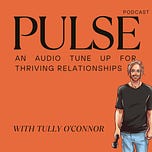Hey Team,
In October I published "The Intimacy Drift in Parenthood" (Part One). Since then, I’ve been deep in dad life, but today, we're exploring Part Two (The solutions) together.
It’s a big topic, navigating the complexities of rekindling the flame after becoming parents. A big part of my mission is to provide actionable insights to help parents like you cultivate thriving relationships.
I recorded a 20 minute podcast exploring this in more depth and have also got a summary of points explored below. I recommend listening to the Podcast Episode first.
So, with that said, let's dive into it with these seven powerful strategies.
1. Stop the Race to the Bottom:
Parenthood often results in us being stretched beyond our capacity—juggling responsibilities, sleep deprivation, and the relentless demands of daily life. It's in these moments that the race to the bottom begins a subtle competition for scarce resources with our partner. What are these resources?
Time,
energy,
solitude,
going to the toilet in peace
etc
When we’re chronically stressed we start operating from the part of our brain that is geared for survival and is hyper focussed on threat. it doesn’t take long for the person we supposedly love the most to be perceived as a threat. As competition.
“More time for them is less for me.”
So we compete to win the victim spot of “who has it harder” because it would naturally be the winner of that spot who gets access to those scarce resources.
The brain defaulting to this “me vs you” way of seeing things is a normal function under intense levels of stress.
The antidote? Pause, recognise the pattern, and remind each other that you're on the same team.
Reinforce the idea that you are co-creators of this experience, not competitors.
2. Embrace Support:
Navigating parenthood alone is a recipe for burnout. We are trying to parent and relate within a system that is not designed for us to thrive. We’re not supposed to be doing it alone. We can’t.
Acknowledge the need for support, be it from family, friends, or hired assistance. In the absence of a built-in village, get creative in finding and welcoming support. Often we’re expecting too much from each other - when really we’re suppose to have re-enforcements Prioritise building a network that can ease the load and strengthen your partnership, and in turn you can do this for others.
3. Prioritise Vitality and Nervous System Nourishment:
Your relationship thrives when both partners are thriving individually. if you’re physically and mentally burnt out, GOOD LUCK trying to rebuild connection and intimacy.
Consider the basics: nutrition, hydration, movement, breathwork, and quality sleep. Don’t get overwhelmed. You don’t need to go crazy with it.
Incremental improvements in these areas lead to a substantial boost in vitality. If you simply shift all of those areas 5% for the better, you’ll have so much more capacity to show up for your relationship.
4. Make Acknowledgement/Appreciation Your Superpower:
The race to the bottom thrives on unnoticed efforts and unspoken challenges. Counteract this by making appreciation and acknowledgment a daily practice. Express gratitude for the unseen work, work on developing more empathy for the challenges your partner is going through and make it a point to share at least three things you appreciate about your partner each day. This simple yet powerful practice cultivates more connection and safety than you’d think. Implement it for a week and experience it for yourself.
5. Celebrate the 5% Shifts:
When you’re in the thick of it, the prospect of a complete relationship overhaul can feel overwhelming. Instead, focus on celebrating small wins. Ask yourself the question,
“What would a 5% shift in connection, communication, or desire look like?”.
You’ll get an answer that feels way more manageable.
When you’re deep in the valley of relationship despair, the thought of climbing the mountain can almost do more harm than good. Focus on the next step.
These achievable wins build momentum and provide a tangible roadmap for positive change.
6. Explore Non-Sexual Intimacy:
This is key. We often think of intimacy as being sex. Sex is part of intimacy but it isn’t the whole picture. During the postpartum period where sex isn’t on the cards at all/as much as it once was then it’s imperative to explore and deepen the non-sexual intimacy in the relationship.
Rediscovering each other beyond the roles of parents is crucial. Create space for deeper conversations and prioritise non-sexual touch. Foot massages, back rubs, cuddling, head massages - these are all powerful tools to cultivate connection while also being extremely nourishing for the nervous system (that vitality piece). This non-verbal communication/connection becomes particularly powerful during times of stress and disconnection.
7. Learn New Relationship Skills:
Parenthood often exposes the gaps in our relationship skill set. Up-skilling isn’t just a nice idea; It's a necessity. Commit to learning and improving communication, emotional intelligence, and other essential skills. Recognise that these skills not only enhance your partnership but also contribute to becoming a better parent. Understanding concepts like nervous system regulation, attachment patterns, inner child work, forgiveness, healthy communication, conflict repair etc ALL transfer over into the way we parent.
So there we have it. Seven things that can support you in reigniting the spark.
And remember, it's not just about rekindling the spark, it's about building a foundation for lasting fulfilment and connection.
I’m curious, which of the above jumped out for you as being most important for your relationship right now?
Let me know with a comment
In your corner,
Tully
PS: If you want to deep dive into all the skills and frameworks required for you to significantly improve your communication, intimacy and confidence in the direction of your relationship - join us in Liberating Love Relationship Mastery .(Early enrolments mean you save $800, have access to extended payment plans, and two modules become available straight away. Early enrolments close Wednesday 9pm AEST, Less than 4 hours from now. Or add yourself to the waitlist so you get notified in January when regular enrolments open)













Share this post